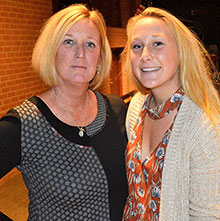Austin Eubanks’ trauma began the morning of April 20, 1999, when a dozen of his classmates — including his best friend hiding under a table with him — were shot and killed at Columbine High School. But the trauma lingered for 12 more years in another form: his addiction to opioid drugs.
A Growing National Crisis
|
The infamous massacre wounded Eubanks’ hand and knee, but left deeper emotional gashes that led from painkillers to a drug addiction that nearly destroyed his family and career. He recently told his cautionary tale to nearly 500 people in Rockford, some of whom had suffered wrenching losses of their own to America’s opioid epidemic.
“My physical injuries healed very fast,” Eubanks said in his talk at Rockford High School. “But once my physical injuries healed, my emotional pain was just as debilitating. Knowing what I know today, I believe emotional pain is what’s driving the addiction epidemic.”
Related: A Survivor’s Story: ‘I Did Not Want to Feel’ – Austin Eubanks’ testimony of trauma, addiction and recovery was compelling and terrifying, beginning with horrific sounds of the Columbine High School mass shooting.He played part of a 911 call made by teacher Patti Nielson from the library, where students Eric Harris and Dylan Klebold murdered 10 students and injured 12. Nielson can be heard screaming, “Under the table kids!” and, later, Dylan Klebold shouting “Everybody get up!” to the sound of gunfire…
That pain and its wreckage is running rampant through society, Eubanks and other speakers said at the Developing Healthy Kids community forum. The ongoing mental health and suicide prevention series zeroed in on a growing crisis hitting all sectors of society, from rural regions and big cities to seemingly safe small towns like Rockford.
One of the epidemic’s victims was Wendy Bubin’s son Bobby, a 2007 Rockford High graduate who died on Christmas Eve, at age 27, of an accidental heroin overdose. She and her daughter, Grace, gave an emotional appeal to take the opioid crisis seriously.
“Never think this can’t happen to you, or someone you know or love,” Wendy Bubin told the hushed crowd, struggling against her grief. “He didn’t want to die. He would want you to know that.”
Alarming Rise in Overdoses
The forum put local focus on a national problem that President Trump last week declared a publichealth emergency, calling it the worst drug crisis in U.S. history. Opioids are fueling an alarming rise of drug overdoses that officials say are now the leading cause of death among Americans under age 50.
Dr. Jeanne Kapenga, president of Grand Rapids Families Against Narcotics, emphasized that drug addiction is a treatable disease, not a moral failing. Kapenga asked audience members to raise hands if they knew someone addicted, incarcerated for drugs or who died of an overdose. A multitude of hands went up.
“You can see for yourself, it is here,” Kapenga said. “It’s right here.”
The forum was planned after school officials met last year with Families Against Narcotics to help support a family with an addicted child. That conversation illuminated “the gravity of the opioid addiction” problem and the need to address it locally, said Kirsten Myers, executive director of special services for Rockford Public Schools.
The program is part of an effort make parents and students more aware of a growing problem, said Superintendent Michael Shibler.
“Passing stricter laws isn’t going to deal with it,” Shibler said. “It’s really building a responsible behavior, and you start that with awareness.”

Arrests Not the Answer
The event included a take-back of leftover and expired medications, distributing kits of naloxone (commonly known as Narcan) and training to use them to reverse an overdose. They ran out of kits, said Brandon Hool, who trains people in their use for the Grand Rapids Red Project.
As part of a panel discussion, Hool told of his struggle to overcome an opioid addiction that made drugs “more important than food.” Panelist Mary DeBoer, executive secretary of Families Against Narcotics, told of losing her 17-year-old son to a heroin overdose in 2003. Kent County Sheriff’s Lt. Alan Roetman said the department had responded to 67 overdose calls so far this year, saving all but one life.
Roetman emphasized the need to call 911 if someone you’re with overdoses, noting the law protects those who call from criminal prosecution. Education and treatment are crucial to curtailing the epidemic, he said, adding, “It’s not a law enforcement problem. It’s a community problem. We’re not going to arrest our way out of this.”
Wendy Bubin said drug education has come a long way since Bobby was in school. In brief, emotional remarks, she said that despite excelling in hockey and lacrosse and graduating with honors, her son became addicted after experimenting with marijuana and taking painkillers for a rugby injury.
A lover of the outdoors with “a kind heart and fun spirit,” he dropped out of college and repeatedly relapsed from treatment, finally being sent to Kent County Jail in an effort to keep him alive, she said. Ten days after his release, he died from the heroin overdose.

Bubin said she told Bobby’s story to let people know addiction can happen to anyone. Seeing all the people who raised their hands because they knew someone who is addicted “put shivers down my spine,” she said.
“Five years ago, they wouldn’t have had the courage to raise their hand,” Bubin said. “We’re just bringing it out for people to talk more.”
Grand Rapids Families Against Narcotics meets the first Tuesday of the month, from 7 to 9 p.m. at St. Mark’s Episcopal Church, 134 N. Division Ave. in downtown Grand Rapids. All are welcome.
CONNECT
Summary of Opioids and Their Effects









